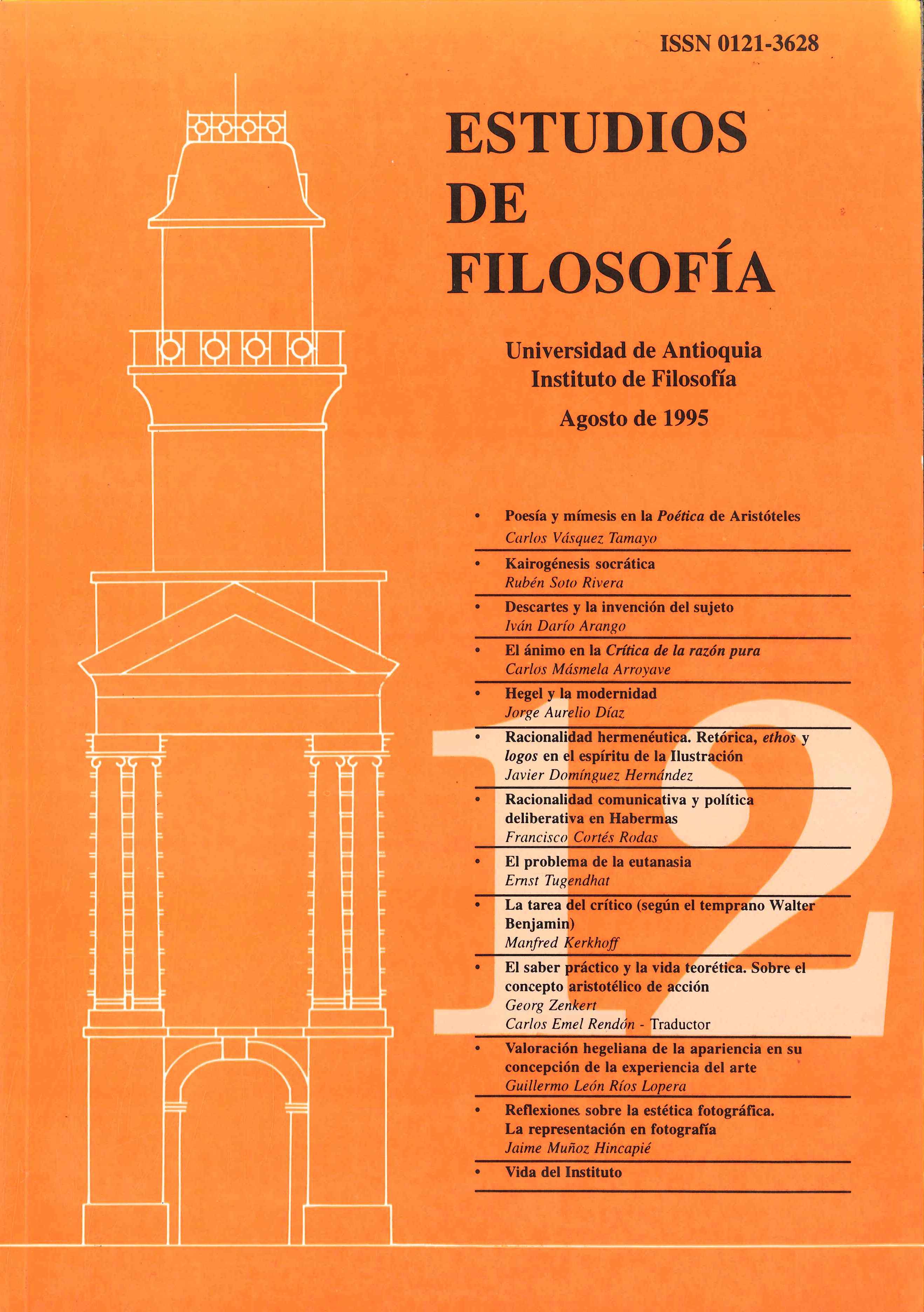Poesía y mímesis en la Poética de Aristóteles
DOI:
https://doi.org/10.17533/udea.ef.338751Palabras clave:
Aristóteles, catharsis, Eleos, Phobos, mímesis, mithos, poéticaResumen
La poética de Aristóteles gira alrededor de la definición de tragedia, y de un análisis de la construcción del Mythos, su contenido y sus exigencias formales. Así, la mímesis se liga a lo universal, lo verosímil y/o lo necesario; penetra en el plano de lo efectual, determinante en la consideración de lo trágico. De ello se desprende un diferencial platónico en la consideración de la Mímesis. El texto penetra el contenido de la Catharsis, término apenas mencionado en la definición de tragedia pero en el que se contiene la fuerza problematizada de la concepción aristotélica de la poesía. Al final se intenta relacionar dicha noción con el Eleos (compasión) y el Phobos (temor), que soportan el carácter comunitario del quehacer poético.
Descargas
Descargas
Publicado
Cómo citar
Número
Sección
Categorías
Licencia
Derechos de autor 1995 Carlos Vásquez Tamayo

Esta obra está bajo una licencia internacional Creative Commons Atribución-NoComercial-CompartirIgual 4.0.
Los autores que publican en Estudios de Filosofía acuerdan los siguientes términos:
1. El Autor retiene el copyright del "Artículo", por el cual se entiende todos los objetos digitales que pueden resultar de la subsiguiente publicación o distribución electrónica.
2. En conformidad con los términos de este acuerdo, el autor garantizará a Estudios de Filosofía como Editor el derecho de la primera publicación del artículo.
3. El Autor le concederá al Editor un derecho perpetuo y no-exclusivo, así como una licencia de la misma clase, de publicar, archivar y hacer accesible el Artículo parcial o totalmente en todos los medios conocidos o por conocerse, derecho y licencia que se conocen como Creative Commons License Deed. Atribución-No Comercial- Compartir igual CC BY-NC-SA o su equivalente que para efectos de eliminar toda duda, le permite a otros copiar, distribuir, y transmitir el Artículo bajo las siguientes condiciones: (a) Atribución: Se deben reconocer los créditos de la obra de la manera especificada por el Autor a Estudios de Filosofía, pero no de una manera que sugiera que tiene su apoyo o que apoyan el uso que hace de su obra. (b) No Comercial: No se puede utilizar el Artículo para fines comerciales.
4. El Autor puede realizar otros acuerdos contractuales no comerciales para la distribución no exclusiva de la versión publicada del Artículo (v. gr. ponerlo en un repositorio institucional o publicarlo en un libro) con la condición de que haga el debido reconocimiento de su publicación original en Estudios de Filosofía.
5. A los Autores se les permite y Estudios de Filosofía promueve publicar en línea (online) la versión pre-impresa del Artículo en repositorios institucionales o en sus páginas web, antes y durante la publicación, por cuanto que puede producir intercambios académicos productivos, así como una mayor citación del Artículo publicado (ver The Effect of Open Access). Dicha publicación durante el proceso de producción y en la publicación del Artículo se espera que se actualice al momento de salir la versión final, incluyendo una referencia a la URL de Estudios de Filosofía.















